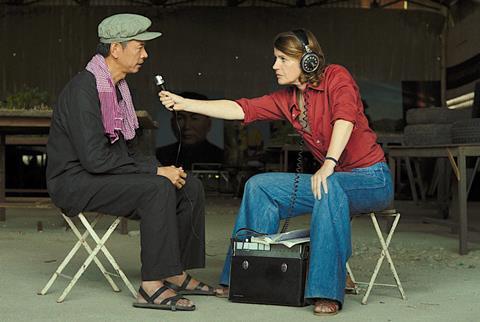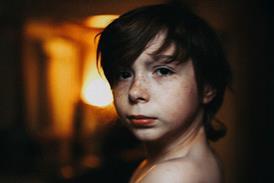Rithy Panh dramatises a real-life event in this period thriller about three French journalists who travel to Cambodia to interview the Khmer Rouge leader

Dir: Rithy Panh. France/Cambodia. 2024. 112mins
Rithy Panh continues to bear witness to the history of Cambodia in Meeting With Pol Pot. His typically resourceful, freely-adapted dramatisation draws upon Elizabeth Becker’s expansive non-fiction book ’When The War Was Over’ picking out the thread of three journalists who were invited to interview Khmer Rouge leader Pol Pot in 1978. The moment becomes a reckoning between propaganda and reality, idealism and disillusion.
Rithy Panh continues to bear witness to the history of Cambodia
Like Panh’s Oscar-nominated The Missing Picture (2013), the film is a journey that becomes a search for truth. Panh’s more conventional approach might disappoint some fans used to his documentary work, but the thriller elements and the attractive cast (Irene Jacob, Gregoire Colin et al) might also render it more commercial. It’s the second time Panh has visited Becker’s book, with 1996’s Bophana also drawn from testimonies contained there. Dulac Distribution will release Pol Pot in France on June 5th after a world premiere in the Cannes Premiere section.
Inspired by true events, Meeting With Pol Pot begins as French journalists Elise Delbo (Irene Jacob), Alain Cariou (Gregoire Colin) and photojournalist Paul Thomas (Cyril Guei) fly to Democratic Kampuchea (now Cambodia) at the request of the Khmer Rouge. They have been promised an interview with Pol Pot, a scoop too great to resist. The stirring, suspenseful music by Marc Marder adds to the feel of a political thriller from that era, or a novel by John Le Carre or Graham Greene. All of the reporters take a slightly different approach to the task. Elise is businesslike and efficient. A slightly smug Alain wears his friendship with Pol Pot as a badge of honour, feeling that his political sympathies might afford him special privileges. (Pol Pot had studied in Paris in the early 1950s.) Paul is more guarded, intent on taking all the pictures he can.
It soon becomes apparent that the regime will restrict the trio’s movements and only allow them to witness what is officially approved, leaving them stranded somewhere between tourist and captive. There is a visit to a sculpture and painting workshop, a meeting with a peasant who seems terrified of speaking out of turn, a meal with a military co-operative that unfolds in complete silence. Everything is designed to extoll the virtues of the new society being created by the Khmer Rouge as they aim to replace the values imposed by colonialism, imperialism and the evils of capitalism.
The journalists’ reactions to events become the driving force of the story. Alain remains sympathetic to the Khmer Rouge’s ambitions and is unwilling to rock the boat. Elise is more pragmatic, hoping to find some friends in Phnom Penh who have gone missing. Paul is more outraged, prepared to strike out on his own and pay the consequences for evading their hosts. And, as the three journalists begin to piece together what is really happening in Cambodia, they seem to represent western eyes that had been shielded from the genocide. Alain in particular is required to search his conscience and question the price of a glorious revolution built on genocide and the destruction of individual human rights.
The thriller-like intrigue in Meeting With Pol Pot is sustained by tension around whether the title event will ever actually happen and, ultimately, whether any of the trio will make it out alive. Radio reports talk of growing threats along the border with Vietnam, and there is a sense that the days of the Khmer Rouge are numbered.
Panh brings some familiar elements to the storytelling, making sparing use of black and white archive footage to lend authentic detail to the film. He also uses clay figures, previously seen in The Missing Picture, to depict events and discoveries that were never documented on film. It is a means of effectively conveying the starvation, torture and mass graves unleashed by Pol Pot, who argues “better an absence of men, than imperfect men.”
Production companies: CDP, Anupheap Production
International sales: Playtime, joris@playtime.group
Producers: Catherine Dussart, Roger Huang, Justine O.
Screenplay: Rithy Panh and Pierre Erwan Guillaume, based on the book ’When The War Was Over’ by Elizabeth Becker
Cinematography: Aymerick Pilarski
Production design: Sareth Mang, Chanry Krauch
Editing: Matthieu Laclau, Rithy Panh
Music: Marc Marder
Main cast: Irene Jacob, Gregoire Colin, Cyril Guei, Bunhok Lim, Somaline Mao
























